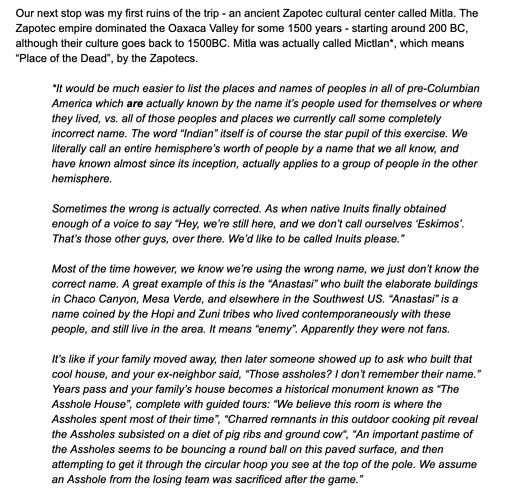Possibly just personal preference but I’d drop the quotation marks around the word discovered.
Agreed. Quotes are for quoting, not scaring people or saying things you don’t really mean.
Btw here is an example of me writing about as well as I think I can:
https://medium.com/@suzzer99/how-not-to-do-a-job-search-1e99d96358c6
If this still needs massive editing - well the book’s not gonna be much better. But I feel like this is pretty good writing. Apparently when something grinds my gears, and also includes a heavy dose of me writing about myself, I can write with purpose and clarity and spit out well-paced prose. Basically like I’m posting on a forum.
The parts of the book where I’m not coming close to my expectations are where I’m coming from a different place and I don’t seem to have found my voice yet - me as some kind of historian. The writing comes out stilted, passive and with endless clauses. Then I get stuck in the mud and can’t find a way around.
I find expository writing infinitely harder than dialog or story-telling, which I think come natural to me to some degree. I feel like every sentence is a puzzle to cram in all the information I want to get across w/o turning it into a run-on, and every paragraph a puzzle to keep from having to break into a new one. The result has no flow whatsoever.
I think I just need to keep grinding through it and eventually I’ll find my expository voice. I feel great about the themes of the book and the stories of stuff that happened, and think there’s plenty enough humor. I just can’t seem to pull it off right now - like I have some image of a painting in my head but I don’t have the skills to paint it.
I guess to be fair I revised this post about 20 times before I posted it (and several edits after). But I didn’t get frustrated that I just can’t write a good forum post, I just kept tweaking it until I like it. So maybe a lot of it is my attitude. I get frustrated because I desperately want to write a good book (and fear that I can’t). But a forum post which is questionable if I get any gain at all from spending time on - I’ll willingly spend a half hour on. Weird.
Can you fit exposition into dialog or story-telling, even if it means inventing a composite character for you to spew facts at?
If it’s like posting on a forum, maybe the history parts fit in better like a derail organically arising from tangential thoughts.
Who are the writers who you think do the expository stuff well? Have you tried analysing how they do it? If I were you, I’d try and get their style into my head and then sit down and try and replicate that for a paragraph or two of your own writing that you’re currently having difficulty with.
Before doing that though, I think I’d try and finish the first draft of all the bits that you think you can write well now - the storytelling bits etc. I don’t know how many words you’ve written but I suspect you’ll feel more confident if you have 70,000 words you’re fairly happy with than if you only have 10,000 and are getting hung up on parts you’re finding difficult.
If you’re looking for a bit of outside motivation, there are some books on writing that I’ve found good:
Stephen King’s On Writing is great, but also worth a read are Bird by Bird (Anne Lamott), On Writing Well (William Zinsser) and Writing the Memoir (Judith Barrington). I especially like Lamott’s advice that all good writers write shitty first drafts and that that is how they end up with good second drafts and terrific third drafts.
Enjoyed the mediun post. Stuff you’re having issues writing well, just write it. Doesn’t matter if is terrible and weeks of work needs cutting completely. Make yourself write a page or a half hour a day or whatever. Sometimes you gotta power through a block by writing garbage. You’ll figure it out if you do it enough so just do it. Don’t get it right, get it written.
All right, well with the help of my writing coach, we’re rolling now - over 80k words which is lol because 70k words is what first-time author’s are supposed to shoot for. And I’m still in central Mexico. I’m starting to think it might be two books - Mexico, and Central America.
Ignore everything I wrote above - I was on the total wrong track. I was trying to sum up the Baja section in 3 paragraphs up front, like it was a newspaper article or something. It’s a story. You start by just beginning and pull the reader along to discover all that stuff. I have no idea why I was so stuck on that. The writing coach really helped there.
I’m going to paste this one thing I wrote that I’m kind of proud of - just to give you an idea of the flavor of the book.
I won’t be posting too much else here until I get a real first draft. But at that point I’d love feedback on what works and what doesn’t for anyone who wants to read parts of it.
fun last paragraph
‘it’s’ in the first paragraph doesn’t get an apostrophe, where it’s 1st used. the 2nd time it’s used in that paragraph is fine obvs.
possessive pronoun both times or something: its people, its inception
It’s good and interesting, I hope the book is filled with facts and some of the suzzer personality sprinkled in, like with the “asshole” story.
I think what you can focus on is just simplifying and using fewer words. The first sentence of the * section is clunky and I would try to change it to something like:
“Compared to what they were called by the native inhabitants, the vast majority of names and place names currently used in pre-Columbian America are completely incorrect. The word “Indian” is of course…”
Where I might add more words is say how Mitla/Mictlan are related (etymology) and that it’s close (maybe/maybe not? Sounds similar.) Then transition into how it’s often way off, the word “Indian” is the classic example.
Thanks yeah - I always type that wrong, usually I clean it up. I have an editor so I’m not super worried about typos at this stage - just the broad strokes. I still have many re-drafts to go once I get this monster first draft out.
Yeah that feels clunky to me too, and the part about the person asking the neighbor about the cool house. Sometimes I get stuck and I just can’t think of another way to say something. Often it helps to come back later and then it flows out much easier.
good to see you’re inspired! hold it down, get it done 
Yeah like you said, you have more words than they suggest and want to split into 2 books. Whether you do it now or at the end, I would go back and try to improve small flows and transitions where you can and take out words wherever you can to simplify what you are saying. Try to be more concise during the fact portions, then hit us with the “…it’s like, this thing is totally related to that!..” and relating it to your own experience and the people you met.
As you said, it’s a story. Leave summing up a Wikipedia article then adding your thoughts to people like Mason. As a story, the main character is you.
The snippet you posted works as an aside that you are weaving into a narrative, but the effectiveness of it can’t truly be judged without seeing how seamless of a transition you can make back into the rest of the story. A natural direction to go would be talk about why it is now known as Mitla or possibly why the Zapotecs were assholes.
I wouldn’t say the cool house example is clunky, exactly, but I can’t figure out how much of that sounds like your voice and how much of it feels like an attempt to mimic the irreverent tone found in the books of someone like Anthony Bourdain. In isolation, the passage makes sense, but it depends on how it fits in with everything else. It will stick out if it is the only section written in that tone.
I normally see it as “Anasazi”, not “Anastasi”. Is there a reason for using that uncommon variation? I am also lead to believe this term was coined by the Navajo and the Hopi/Zuni are descendants, not contemporaries, of the people referred to as the “Anasazi” and are the ones who object to that term.
Good catch! I was remembering that all wrong from my tours of Mesa Verde and Chaco Canyon. It looks like the Hopi and Pueblo people may be descendants of the Anasazi (I even remembered the word wrong). And the term is definitely Navajo. Thanks.
There will definitely be one round of intense fact-checking before I self-publish it (unless some miracle happens and someone else publishes it). The idea now is to just keep plowing ahead and get the first very rough draft out. I’m not going to do footnotes but I will do a bibliography.
I’m patterning this book after Bill Bryson’s Australia travel memoir - In a Sunburned Country. I’d say that book is about 70% Australia and 30% him bumbling around getting into things, along with plenty of tangents like his hilarious take on cricket on the radio, and random stuff like his vivid description of drooling all over himself when he falls asleep in someone’s car.
My book might be closer to 50/50 me and my adventure vs. local history. I thought it was going to be 70/30 me vs. history. But I’ve become so fascinated with Mexican history that I keep writing more and more of it into the story. Every Central American country is probably going to be the same.
By a very weird coincidence my buddy from NYC was in Mexico City at the same time - staying at his girlfriend’s family estate. Apparently they’re some kind of super old Mexican money. Her house was like a museum. One of the floor to ceiling portraits features one of her ancestors meeting with Emperor Maximillian.
At the time I was like “oh that’s weird, I didn’t know Mexico had emperors”. Then I looked up the story and that’s some crazy shit.
Basically Mexico recruited some Hapsburg prince to come be their emperor. Then of course he gets executed in the end, like most of Mexico’s early leaders. Wiki is kind of dry, I have another book that really lays it all out. So now I have to put that in obviously. I was thinking I’d just do Mexico pre-Columbian history, but there are so many good stories between the independence from the Spanish and now. Mexico had a guy last 45 minutes before being dethroned - a world record that still stands.
At this point I feel like I’m just throwing anything I can think of against the wall. If it pops into my head and I like it, I write it into the book. Later I will go back and see what stuck.
Research fail.
I’ve been reading about the Zapotec ruins that I went to on my trip - Mitla and Monte Alban - on this website which seems well-sourced and thorough (in addition to the book 1491, and a few other books so far about Zapotecs, Olmec, Aztecs, Maya and some others). He seems to have some different theories, but then again so do 1491 vs. the other history books. I chalked it up to the fact that no one really knows very much about ancient peoples.
So he has this theory that the Olmec decline and a Zapotec city called San Jose Magote both in 500 BC could be due to a huge epidemic. This is also backed up a bunch of bas reliefs of diseased-looking people at Monte Alban from around that time. He goes on to posit that Monte Alban was deliberately founded on a hilltop in 500 BC to get away from this epidemic. Ok.
Then this gem pops out:
There is growing evidence that epidemic diseases may be brought to earth via meteors[1]. These unknown diseases then rage through the population until either the conditions of the earth cause it to mutate into an ineffective germ, or the only humans remaining are those immune to it – hence it dies out and never returns. It is theorised that a comet traveling through the Earth’s orbit could deposit diseases within its tail, which could then be pulled to Earth as we travel through its wake.
Wait. Hold up. What? So I followed the footnote down a rabbit hole for a bit. Apparently there have been a lot of books about disease coming from meteors and comets - all discredited of course. But the myth keeps chugging.
So now I have to go back and look at any idea I got from this guy about Mitla as just someone talking out of their ass. At least I never quoted him. I am getting ready to write Monte Alban now. Of course I hit the crazy on the last post out of like 10 about Mitla and Monte Alban.
Well at least at the end of it he calls it out as an alternate theory and says we’ll probably never know. Fine - go crazy.
Suzz, you’re a universally loved poster. When you’re crafting a post, it’s obviously genuine and off-the-cuff
How do you reconcile what has proven successful and endearing, with a more deliberate method. Gotta drive you a bit nuts lol
Dude, travel writing from the perspective of dissecting wild ass origin theories of ancient societies, disease outbreaks, colonization outcomes, etc with a view towards unearthing the absurd confirmation biases that these people are normally peddling would be 100% traditionally publishable stuff.
I definitely think you should consider a longform essay piece on the subject after you finish this project, and try to get it published online. That could be a springboard to a book on the subject.
Also, this thread has inspired me to go down the rabbit hole of figuring out WTF to do next on my writing project. I’ve got 73,000 words written about Haiti, and the rough draft is probably 95% done from a text perspective. Going for traditional publishing. I gather the next step is beta-reading a few times over.
The transition from simply writing a bunch to thinking about editing and marketing a book is fucking terrifying, and this thread is what caused me to do it. So, thanks for that. 
Are you the geography guy who did that trip to the densest populated island or w/e? That was incredible! That took some insane balls and follow through. I loved that story. Could easily be a book.
If it’s not you I’ll dig it up. If it is you please post. I want to read it again. Seriously that was the coolest thing I read in a long time (that you, or the other person, actually went there).
I do wrestle a lot with - how can I know exactly when and how to end and begin a sentence when I post, yet that same skill completely flummoxes me so often in trying to write this book? I feel like my writing comes out like a pretzel sometimes.
Maybe 200k posts on various message boards helps in that regard. A lot of stuff is rote by now. But even if it’s a different kind of writing, I still think all those posts have helped my book-writing immensely. For one thing even though I haven’t written creatively since college, at least I’ve still been practicing writing all this time.
Arguing on message boards really teaches you how to be clear and concise. You never want to leave any wiggle room for your opponent. And you also learn how to break up the monotony with stuff like indented quotes, bold text, images, etc. One weird thing with the book is I keep wanting to make super short paragraphs - like I do when posting. I haven’t decided if that’s good for the book or not. I do write documentation for work, which also needs to be super clear and concise.
But the writing coach has told me to just plow through that flummoxed part, get the broad strokes down. When I come back after some time, maybe I’ll be able to think of clearer ways to write something. I hope that’s true. It does make some sense, as when I first think of how to write something, if it doesn’t come out right it’s very hard for me to find a different way.
For me anyway, there’s a rhythm to writing. I can’t just mechanically put words together and make a sentence. If I do it takes forever and I still hate it. It feels like design by committee. If I have to think about sentence structure, or get out the thesaurus out, it almost never works. When I’m in rhythm I crank out 5k words in a few hours. So hopefully when I got back for a second pass, the rhythm will materialize for parts that I had to grind through on the first pass.


